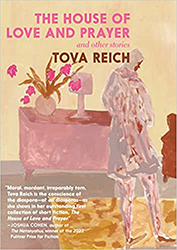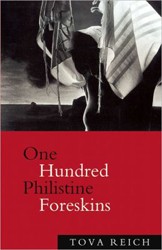Written with intimacy, and occasionally even brutal honesty, Mother India follows the experiences of three generations of Jewish women who go to India in search of transformation and transcendence. They want to know if it’s possible to gain what they call “eternal release from the profound suffering of life.” Witty and satirical, the writing has bite. We come to love and identify with narrator Meena Sati, formerly Meena Tabor of Brooklyn, an American woman who attempts to make India her spiritual and physical home.
The story is deeply original, profoundly funny, and darkly satisfying — a result of Reich’s skillful juxtaposition of the myriad elements of faith, society, mother-daughter love, and personal identity. A perfect book club read, the novel contains complex characters, profound insights, and a thickly layered plotline that will engage readers from start to finish.
The story unfolds in three parts (“Ma,” “Maya,” and “Meena), all of which take place in a starkly comic universe. All of the characters — not only the women who travel to India, but the people there whose lives they touch — are drawn with depth and drama. Meena’s mother, Ma, for example, is a traditionally observant Jew and the widow of an Orthodox rabbi who wants to die in India and be cremated in the Hindu tradition, on the banks of the Ganges River — despite the fact that cremation violates Jewish law. Ma seeks the help of her daughter and granddaughter in achieving these wishes.
Meena’s former lover, Geeta, an Indian woman, winds her life around Meena and her family in both passionate and hilarious ways, particularly when she decides, in a fury of black humor, to leave them. Her character works as a literary foil against Shmelke, Meena’s twin brother, who turns out to be not only a rabbi and a sometime-guru but also an international fugitive.
Much of the book deals with loss. Even when Maya deserts her mother, Meena — first to a group of Chabad Orthodox Jews and then to an Indian cult — we see how Meena surrenders to faith and gives up responsibility for herself. Despite breaking from her own Orthodox family, she is continually drawn toward new definitions of what it means to honor a higher power.
Reich has carefully honed her ability to transmit her comic vision on the page. In Mother India, she uses those skills to bring us insights into religion and cults, marriage and motherhood, India itself, and the universal dream of finding one’s correct path in life.
Linda F. Burghardt is a New York-based journalist and author who has contributed commentary, breaking news, and features to major newspapers across the U.S., in addition to having three non-fiction books published. She writes frequently on Jewish topics and is now serving as Scholar-in-Residence at the Holocaust Memorial & Tolerance Center of Nassau County.





